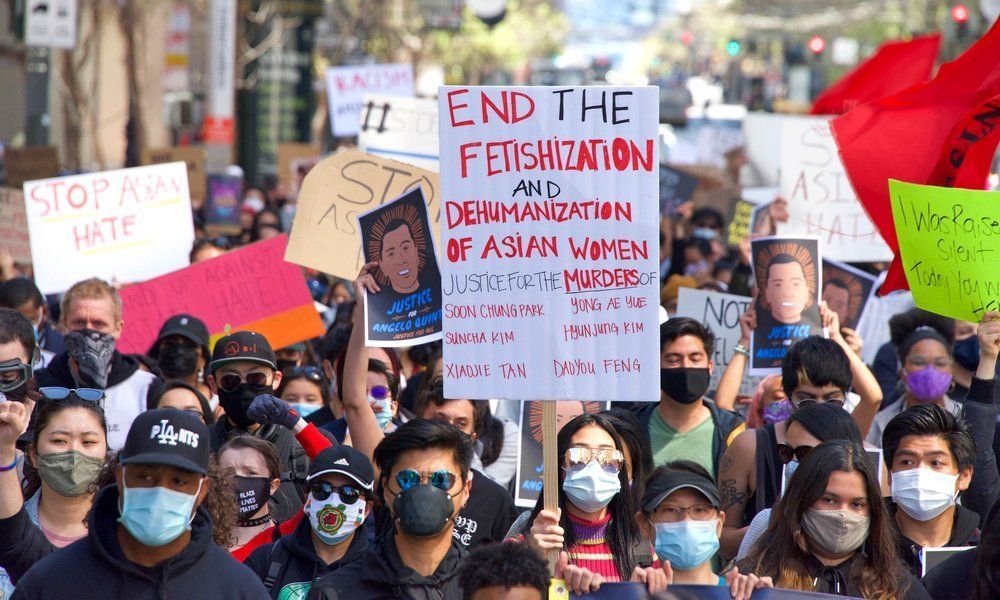THE LEORA LETTER
Boys will be boys…and girls will be sluts.
March 15, 2022

“Slut,” “hoe,” and “thot” are slippery and subjective terms that can apply to any girl or woman, regardless of how they dress or behave. I shed light on slut-shaming—how and why assumptions about being “too” sexual are applied, the consequences for women, and the impact on everyone, regardless of gender.
Slut-shaming matters because when people are dismissed as sluts, hoes, and thots, they are denied care and compassion in a variety of situations, including when they are sexually harassed, sexually assaulted, and need an abortion.
Q&A with Political Philosopher Robin Zheng, PhD
Different communities of women experience slut-shaming differently. Asian and Asian American women often face a specific form of nonconsensual sexualization that is rooted in racial stereotypes. But because some men, particularly White men, prefer to date and marry Asian and Asian American women (known as “yellow fever”), the consequences of this preference tend to be erased; after all, isn’t it complimentary when you are a member of a group that has favored status?
Not at all, says Robin Zheng, PhD. In fact, “yellow fever” is a harmful racial fetish. In her article “Why Yellow Fever Isn’t Flattering,” Dr. Zheng argues that this preference is part of an oppressive system of structural racism.
Dr. Robin Zheng is Lecturer in Political Philosophy at the University of Glasgow. Her research focuses on issues of moral responsibility, structural injustice, and social change, with an emphasis on issues of gender, race, and social inequality.

Leora Tanenbaum: Your article is titled “Why Yellow Fever Isn’t Flattering.” Why is it not flattering—and why and how is it oppressive?
Dr. Robin Zheng: Learning that someone has a preference for your race might seem like it’s a compliment (to the way you look, your culture, etc.), but many people don’t experience it that way. Instead, they feel uncomfortable. In my view, this is basically because you are being treated differently, not like a normal person, when you are the object of a fetish.
On the one hand, you're viewed as importantly different from the mainstream (e.g., “exotic”). I call this
otherization. But at the same time, you’re viewed as being essentially similar to everyone in your racial group—what I call homogenization. You’re not being appreciated for the unique individual whom you are, which is what people who are not pursued on the basis of a fetish get to experience.
In my view, “yellow fever” and other racial fetishes are oppressive because of the way they reinforce our ideas of racial difference. This basic belief that there is something essentially
different about different races of people is the foundation for all sorts of racial injustice, and fetishes contribute to that even if the traits attributed to some group are positive.
Tanenbaum: Do you see a connection between “yellow fever” and hate crimes against Asian American women, including the Atlanta murders last year?
Zheng: I do see a connection, but a somewhat complex one. When the Atlanta murderer went after women whom he considered to be sexually tempting him towards sin, he specifically targeted massage salons owned and operated by Asian and Asian American women. These cultural associations between sex, sinfulness, and Asian women are precisely the same associations that make them so attractive to people with “yellow fever.”
Tanenbaum: My research on slut-shaming demonstrates that the stereotype of the “slut” in North America typically is a woman who violates White feminine norms by exercising sexual agency—e.g., a Black or Latina woman regarded as hypersexual because of assumptions stemming from White supremacy, or a White woman perceived as out of control sexually, busty, needy for attention, etc. In my observation, the hypersexualization of Asian American women looks different; notably, the stereotype does not include the element of sexual agency. Does this observation align with what you see in your work? What is the role of sexual agency in the stereotype of the sexualized Asian woman? And why is this important?
Zheng: Actually, l think there are enough stereotypes about Asian and Asian American women to cover all the bases! What you’re probably thinking of is what scholars have described as the “geisha girl,” “lotus blossom,” or “china doll” image of a docile, demure, and sexually willing Asian woman. But the flip side of this is the “dragon lady” image of Asian women who are scheming and malevolent and who use their sexual allure for deceitful ends — which does characterize them as exercising sexual agency. But, in line with what you noted, this understanding of sexual agency violates the norms of morality and feminine decency. This is important because it reinforces the patriarchal notion that any sexual agency on the part of women should only be directed towards serving men’s desires, rather than their own.

Hundreds participate in an anti-Asian violence rally in San Francisco on March 26, 2021. Photo credit: Sheila Fitzgerald, Shutterstock
Tanenbaum: Could you explain how "yellow fever" and slut-shaming intersect?
Zheng: There are definitely important intersections between slut-shaming and Asian fetish, because both phenomena are highly concerned with female sexuality. To take one example: It is a very regrettable fact that many Asian men vocally disapprove of relationships between Asian women and White men (due to an implicit and highly problematic assumption that Asian women “belong” to men of the same race). Sometimes, [this disapproval] takes the form of slut-shaming because the supposed sexual appeal of Asian women makes them easy targets for assumptions about their promiscuity.

Key takeaway: A “preference” for Asian and Asian American women is not a compliment. This attitude is a dangerous fetish and form of racialized slut-shaming. It is never acceptable.
Share Your Story
Have you been sexualized against your will? How did this experience make you feel, and did you push back—or not? Email me at leora@leoratanenbaum.com and let me know if I may quote you—anonymously—in a future issue of this newsletter.